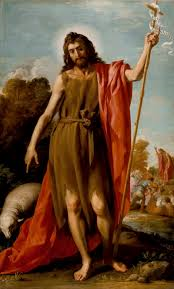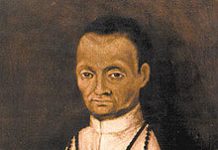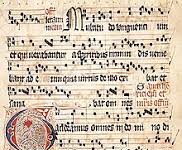‘Truly I tell you, among those born of women no one has arisen greater than John the Baptist; yet the least in the kingdom of heaven is greater than he’ (Mt. 11:11).
Today is Gaudete Sunday and the sacred liturgy exhorts us to be joyful as we look forward to the coming celebration of Our Lord’s birth. Once again, we encounter John the Baptist, the last of the prophets preparing the way for the Lord through his call to repentance. In our Gospel reading, Our Lord in turn, also bears witness to John whose preaching has ushered in the age of the Messiah. At first hearing we might find Our Lord’s answer to John’s question somewhat evasive or puzzling: ‘Are you the one who is to come, or are we to wait for another?’ (Mt. 11:3). Nothing could be clearer or more impressive than the answer Our Lord gives to John’s messengers: ‘The blind receive their sight, the lame walk, the lepers are cleansed, the deaf hear, the dead are raised and the poor have the good news preached to them’ (Mt. 11:5). These words are a fulfillment of the prophecy of Isaiah, our first reading attests.
Just as important as the message preached by John is his attitude towards the message. The greatness of John the Baptist which Our Lord praises lies in his humility and self-effacement. He bears witness to the radiance of the Messiah whose coming he has preached, and so he declares: ‘He must increase, but I must decrease’ (Jn. 3:30). These words express very succinctly our own dispositions before the Mystery of God especially as we serve Him both in our worship and in our active charity. St. John the Baptist is set before us today as a model of our own Christian commitment; both individually and collectively. We too must prepare the way for the Lord and proclaim the Good News; and we must do so humbly. If we wish to be instruments of Christ, then we must make every effort to divest ourselves of all that is not of Christ. Only this way can we effectively bear witness to the light of truth with integrity. Otherwise, we stand between the light and those in need of it. The mystery of John the Baptist is still being fulfilled in the world today, most especially through our response to the call to repentance and our willingness to stand firmly in the faith of Christ Our Saviour. Faith in Christ is the highest form of repentance (St. Cyril of Alexandria). Individually and collectively, we continue the work of the Lord’s precursor, showing Christ to the world as the only hope of salvation.
‘Truly I tell you, among those born of women no one has arisen greater than John the Baptist; yet the least in the kingdom of heaven is greater than he’ In these words the mystery of John the Baptist is revealed as a present reality. Our Lord is in no way undermining John’s holiness. Rather, He affirms that even the least of us has an important part to play in the unfolding plan of salvation. We are not some casual and meaningless product of evolution. Each one of us is the result of a thought of God. Each one of us willed, each one of us loved, each one of us is necessary (Pope Benedict XVI, April 24, 2005).
The Prophets looked forward to the New Covenant but did not share fully in its blessings. We however, are firmly established in it. John is greater than anyone ‘born of woman’, that is, anyone born ‘of human stock, or by fleshly desire of a human father’; but he is lesser than anyone who has been given the ‘right of becoming a child of God’, who has been ‘born of God himself’ [Jn. 1:12f] (Erasmo Leiva-Merikakis, Fire of Mercy, Heart of the World, Vol I, p. 659). Even the least aspect of the fulfillment of the promise of salvation is a greater reality than the greatest prophet or prophecy concerning it.
The significance of this truth at the practical level is that whatever is done by us to proclaim and to further the cause of God’s Kingdom is imbued with a spiritual power and significance beyond the very obvious immediate benefit precisely because it is done in Christ and in the power and presence of the Holy Spirit. We are active participants in the unfolding Mystery of Salvation in the times that have been allotted to us. John the Baptist teaches all of us that in the encounter with the living God who comes to save us. Humility and surrender enable us to be drawn into this saving Mystery just as Our Lady was; and from her we learn how to serve this Mystery: ‘Behold, I am the servant of the Lord’ (Lk. 1:38). Beyond the exercise of Christian charity which is especially in evidence at this time of the year, there are realities in the order of grace that can only be perceived in the prayerful silence of our own souls; such that we ourselves like John the Baptist become a sign and source of hope.
More than the many works of active charity performed by Catholics, especially in our outreach to the poor and needy, our collective response to penance and renewal through sacramental confession is a sign to the world of how to receive and share the gift of Salvation. In the humility and self-effacement of this sacrament we make John’s words our very own: “He must increase, but I must decrease’. A humble confession is no less a bold proclamation of the Messiah’s mission to heal and save the human family. In the grace of this sacrament we can begin to understand that in imitation of John the Baptist, all of us can become humble servants of the work of God begun in sacred mystery and wonderfully manifested in Our Lord and Saviour Jesus Christ; a revelation continuously proclaimed, received and celebrated in sacramental grace. Maranatha. Come, Lord Jesus.











